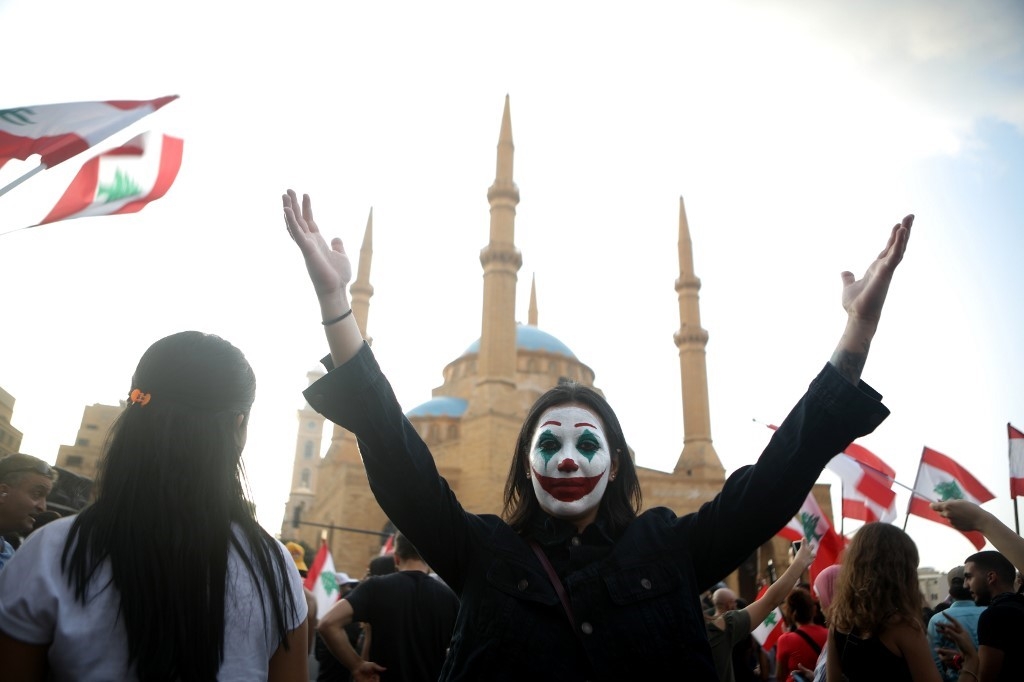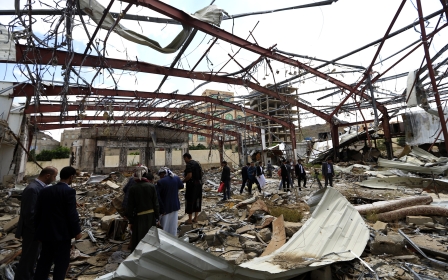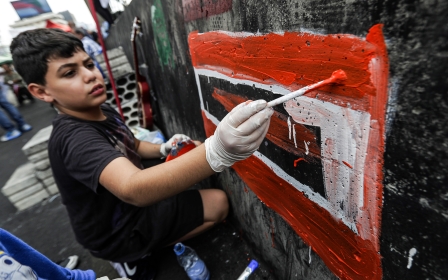Arabic press review: ‘Joker’ gets the blame for Lebanon and Iraq protests

Street protests 'influenced by Hollywood's comic villain'
Al-Manar TV, a channel affiliated with the Lebanese Hezbollah, published a report in which it attacked demonstrators in the streets and claimed that they were influenced by the American psychological thriller Joker.
"Arthur Fleck, the main character of the Joker film, has greatly and noticeably influenced the style of a group of protesters in Lebanon and Iraq. The scene with which the film ended has been replicated on our streets,” the channel said.
Al-Manar added that "the scene of the spread of chaos practised by some protesters is a replica of that portrayed in the film, and their actions, which are a mixture of dancing, singing, cackling and screaming without a clear speech match our current reality to a great extent.”
The channel pointed to the frequent appearance of the mask of "Joker" in the demonstrations of Lebanon and Iraq.
New MEE newsletter: Jerusalem Dispatch
Sign up to get the latest insights and analysis on Israel-Palestine, alongside Turkey Unpacked and other MEE newsletters
Thousands of Lebanese citizens have been protesting across the country over the past weeks to demand a transitional government that would end corruption and avert a potential economic collapse.
So far, the protests have led to the resignation of Prime Minister Saad Hariri earlier this week and President Michel Aoun calling for a new government of experts.
Israeli citizen faces trial in Jordan
An Israeli citizen had been detained in Jordan for illegally crossing the borders and was expected to be referred to the State Security Court soon, Jordan's Al-Ghad newspaper reported on Monday citing Jordanian judicial sources.
The judicial sources stated that the Israeli "infiltrator" was arrested last Tuesday by the Jordanian armed forces, and was being interrogated to find out the reasons for his attempt to illegally cross into Jordan.
The Israeli citizen was also under investigation by the Jordanian security services in preparation for the referral of his case to the prosecutor, according to the same newspaper.
The State Security Court is a military court whose verdicts are not subject to appeals.
If the arrested Israeli citizen in Jordan is tried before this court, it will be a first.
The news of the Israeli's detention has prompted many Jordanians to demand using him as a bargaining chip in an exchange deal for two Jordanian prisoners who have been held by Israel for months.
Yemeni minister celebrates UAE’s Aden pullout
Yemen's minister of transport on Wednesday celebrated the United Arab Emirates’ announcement of its forces’ withdrawal from the southern port city of Aden, saying that it had turned against the legitimate state in Yemen’s interim capital.
"They leave in the darkness of the night, being chased by their dark memories and the treacherous wounds that they left behind in the heart of every free Yemeni," Saleh Al-Gabwani said in a post on Twitter.
"They left Aden, while the Yemeni government hoped that it would have been there as a state to bid them farewell with a full protocol ceremony, and put a rose on the chest of each soldier," added the minister.
He continued: "But they now are leaving after they turned against the state they came to support, and handed Aden to their mercenary employees.”
The UAE announced on Wednesday the return of its troops from Aden Governorate after handing it over to Saudi and Yemeni forces.
Al-Gabwani’s statement was in reference to the bombing carried out by UAE fighter jets against Yemeni army forces in Aden and Abyan at the end of August, and the assassinations of dozens of political activists and mosque preachers.
Gulf sanctions on Iran, Hezbollah
The Gulf Cooperation Council (GCC) countries have placed 25 entities linked to Iran, most notably the Basij Resistance Force, banks and Hezbollah leaders, on terrorism lists. The move coincided with the designation of the same group by the US as terrorist entities, Saudi newspaper Asharq Al-Awsat reported.
The joint classification by the six Gulf states and the US came through the Terrorist Financing Targeting Centre, established in 2017.
The measure, announced on Wednesday, is the largest joint classification in the course of the centre, the Saudi state security presidency said in a statement, adding that many of the targeted companies provide financial support to the Basij forces, a religious volunteer paramilitary group which Iran has long used to recruit and train fighters and carry out attacks in the region.
The US said shell companies and other measures were used to mask Basij ownership and control over multibillion-dollar business interests in Iran’s automotive, mining, metals, and banking industries, many of which operate across the Middle East and Europe.
* Arabic press review is a digest of reports that are not independently verified as accurate by Middle East Eye.
Middle East Eye delivers independent and unrivalled coverage and analysis of the Middle East, North Africa and beyond. To learn more about republishing this content and the associated fees, please fill out this form. More about MEE can be found here.




